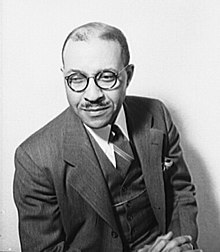Charles S. Johnson
Charles Spurgeon Johnson (born July 24, 1893 in Bristol , Virginia , † October 27, 1956 in Louisville , Kentucky ) was one of the leading black American sociologists who dealt in particular with the situation of African Americans in American society.
biography
After attending Wayland Academy and his BA from Virginia State University in Richmond, he studied sociology with Robert E. Park at the University of Chicago , where he received a PhD in Philosophiae Doctor (Ph.D.) in 1917 .
Because of the race riots in Chicago in the summer of 1917, his research finally became The Negro in Chicago , on the cause and consequences of urban riots, the first of numerous studies published in the 20th century. This highly acclaimed study resulted in Dr. Johnson was elected director of research for the National Urban League.
In 1921 he became research director of the Urban League , which was founded in 1910 as the Committee on Urban Conditions Among Negroes and is considered one of the oldest African American civil rights movements in the United States. Johnson's lifelong commitment to the civil rights of his minority has been criticized by opponents such as WEB Du Bois and E. Franklin Frazier as being too cautious and conservative.
In addition to his activity until his death with the Urban League, he was appointed professor at Fisk University in Nashville of the newly founded Institute for Social Sciences in 1928. The chair was funded by the Laura Spelman Rockefeller Memorial. With the financial resources of the Julius Rosenwald Fund, Johnson founded the Fisk Institute of Race Relations , the first “ think tank ” in a predominantly black institution. After almost twenty years of teaching, he became President of Fisk University in 1946, a position he held until his death in 1956.
In 1929, American missionaries reported that government agencies in Liberia had set up a system that would practically mean slavery. Soldiers forcibly forced villagers to do hard labor on Fernando Po Island . The Liberian government denied this and allowed a League of Nations commission to investigate the incident. Cuthbert Christy was head of this commission and Charles S. Johnson was the US representative on this commission.
Johnson dealt in his research in particular with the situation of Afro-American population groups in the USA and published with The Negro in Chicago in 1922 his first research results on the possible cause of the race riots. Johnson praised the removal of racial barriers in various sectors of society, but he, like many African-American politicians, was particularly interested in ending segregation in schools.
In the late 1940s, his achievements in education and civil rights eventually earned him recognition from various national and international organizations. He was one of ten US delegates to UNESCO (1946-1947), a member of the Board of Foreign Fulbright Scholarships (1947-1954) and a delegate to the General Assembly of the World Council of Churches (1948). He also advised three American presidents on education and civil rights issues.
On October 27, 1956, Johnson died suddenly of a heart attack. World leaders mourned his death and highlighted his important role in the civil rights movement. His grandson, Jeh Johnson , became Secretary of State for Homeland Security in 2013 .
Publications
- The Negro in Chicago . By the Chicago Commission on Race Relations. The University of Chicago Press, 1922
- The Negro in American Civilization (1930)
- Negro housing; report of the Committee on Negro Housing . Nannie H. Burroughs, chairman; Prepared for the Committee by Charles S. Johnson. Edited by John M. Gries and James Ford. The President's Conference on home building and home ownership, Washington DC 1932
- Shadow of the Plantation (1934)
- The Negro College Graduate (1936),
- Growing Up in the Black Belt (1941)
- Patterns of Negro Segregation (1943)
- Into the main stream, a survey of best practices in race relations in the South . The University of North Carolina Press (1947).
Web links
- Charles S. Johnson in nndb (English)
- Biography (Homepage of Tennessee State University)
- Biography (Tennessee Encyclopedia of History and Culture)
- Charles S. Johnson (1893-1956), in: PAL: Perspectives in American Literature - A Research and Reference Guide - An Ongoing Project
- Obituary (The Journal of Negro History, April 1957)
Individual evidence
| personal data | |
|---|---|
| SURNAME | Johnson, Charles S. |
| ALTERNATIVE NAMES | Johnson, Charles Spurgeon |
| BRIEF DESCRIPTION | American sociologist |
| DATE OF BIRTH | July 24, 1893 |
| PLACE OF BIRTH | Bristol , Virginia |
| DATE OF DEATH | October 27, 1956 |
| Place of death | Louisville , Kentucky |
